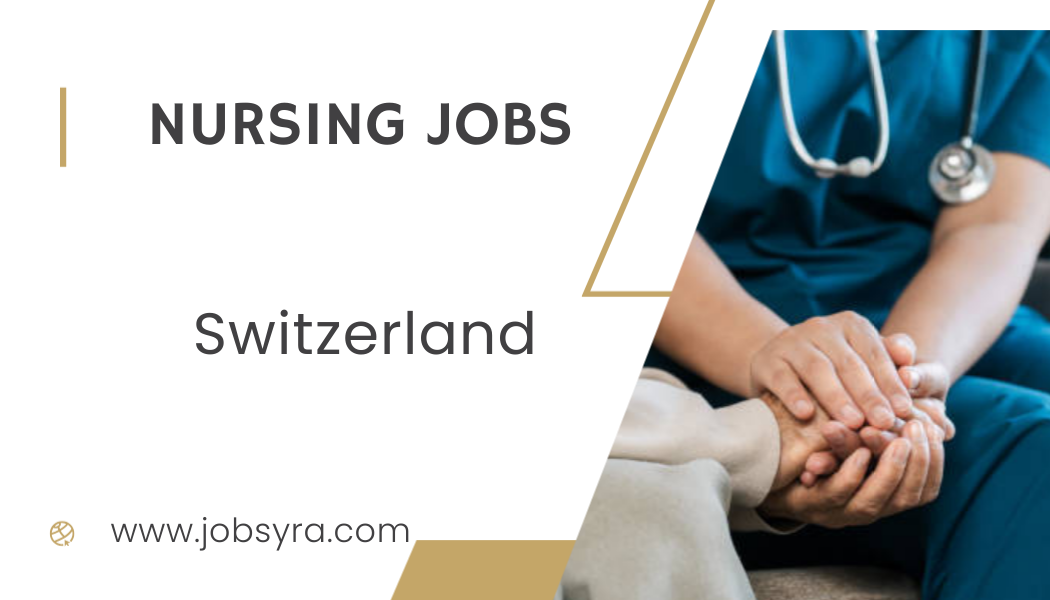Nurse Jobs in Switzerland
Nursing in Switzerland offers a stable and structured career with solid educational pathways and strong institutional support. The demand remains high, and the system is working to strengthen workforce conditions. For foreign-trained nurses, success hinges on navigating credential recognition and language requirements—but the journey can be professionally rewarding.
Reagion: Across Switzerland
Languages: N/A
Experience: Fresher or Experienced
Your Assignments (typical tasks)
- As a nurse in Switzerland, your assignments may include a combination of clinical, administrative and patient-care tasks. Here are key components of a typical nursing role:
- Direct patient care: Administer medications, monitor vital signs, perform wound care, support patient mobility and hygiene, assist in personal care, help with feeding, and support patients with chronic conditions or post-surgical recovery.
- Quality, safety and documentation: Follow Swiss nursing standards, ensure compliance with protocols (e.g., infection control, hygiene, medical equipment use), maintain accurate data, record patient notes, and support audits or quality-improvement measures.
- Assessment and monitoring: Daily monitoring of patients’ condition, recognising changes in health status, documenting findings, collaborating with physicians and other healthcare professionals to adjust care plans as needed.
- Shift work and special settings: Many nursing roles operate on shift rosters (morning, evening, night, weekends). You may work in specialised settings such as intensive care, paediatrics, geriatrics, rehabilitation, home-care. Some roles require German, French or Italian-speaking environments.
- Communication and education: Educate patients and their families about treatment plans, medications, post-discharge care, prevention of complications. Also communicate with other members of the care team, participate in hand-over reports and update patient records.
- Coordination of care: Work with multidisciplinary teams (physicians, physiotherapists, social workers, home-care services) to organise patient care pathways, schedule treatments, assist in admissions/discharges, ensure continuity of care.
- Continuous improvement and professional development: Engage in training, learn new technologies, protocols and methods. Given the Swiss emphasis on high standards, you may be expected to stay updated with continuing education, and possibly specialise further (e.g., oncology, emergency care, paediatric nursing).
What to Do to Apply Successfully for Nursing Jobs:
1. Research the Role & Company
Before applying, it’s crucial to thoroughly understand the role and the company:
- Industry Knowledge: Familiarize yourself with the company’s industry—be it pharmaceuticals, hospitality, manufacturing, or another sector. Each industry has its own set of expectations and standards.
- Language Requirements: Check the language requirements for the position. While English is widely spoken, proficiency in French is often preferred. Some roles may also require knowledge of German or Italian, depending on the company’s clientele and operations.
- Quality and Safety Standards: Particularly in sectors like pharmaceuticals, adherence to quality and safety standards (e.g., Good Manufacturing Practices) is paramount. Research these standards to demonstrate your awareness and commitment.
2. Prepare a Strong CV / Resume
Your CV is your first impression. Ensure it is well-crafted and tailored to the job:
- Personal Information: Include your full name, contact details, and a professional photo. In Switzerland, it’s common to add personal details such as date of birth and nationality.
- Professional Experience: Highlight relevant work experience, focusing on achievements and responsibilities that align with the job you’re applying for.
- References: Including references can add credibility to your application. Ensure you have permission from your referees before listing them.
- Education and Certifications: List your educational background and any certifications pertinent to the role. For instance, certifications in quality assurance or safety training can be advantageous.
- Skills: Emphasize skills that are relevant to the job, such as proficiency in specific software, languages spoken, or technical abilities.
3. Craft a Tailored Cover / Motivation Letter
Your cover letter should complement your CV and provide insight into your motivation:
- Personalization: Address the letter to the hiring manager by name, if possible. This shows initiative and attention to detail.
- Alignment with the Role: Clearly explain why you’re interested in the position and how your skills and experiences make you a suitable candidate.
- Language Proficiency: If the job requires knowledge of a specific language, mention your proficiency level and any relevant experiences.
- Cultural Fit: Demonstrate your understanding of Swiss work culture and how you can adapt to it. Highlight your willingness to integrate into the team and contribute positively.
4. Understand Work Permits & Legal Requirements
Navigating the legalities of working in Switzerland is crucial:
- EU/EFTA Citizens: If you’re from an EU/EFTA country, obtaining a work permit is generally straightforward. However, you must still register with the local authorities.
- Documentation: Ensure you have all necessary documents, such as a valid passport, proof of qualifications, and any required permits, ready for submission.
- Non-EU Citizens: Securing a work permit can be more complex. Employers must demonstrate that no suitable candidate from Switzerland or the EU/EFTA is available for the position. Specialized skills or a job offer in a high-demand sector can improve your chances.
5. Application Submission
Submitting your application correctly is vital:
- Follow Instructions: Adhere to the application guidelines provided in the job listing. This includes submitting all required documents in the specified format.
- Online Portals: Many companies use online application systems. Ensure you create an account, complete all required fields, and upload your documents as instructed.
- Document Checklist:
- CV/Resume
- Cover/Motivation Letter
- Relevant Certifications and Diplomas
- Work Experience Letters (if applicable)
- Research Statements, Publication Lists, Teaching Proposals (for academic roles)
6. Follow-Up and Interview Preparation
After submitting your application, preparation is key:
- Follow-Up: If you haven’t heard back within a reasonable timeframe, consider sending a polite follow-up email expressing your continued interest in the position.
- Interview Preparation:
- Research the Company: Understand its mission, values, and recent developments.
- Understand the Role: Be clear on the job responsibilities and how your skills align.
- Practice Common Questions: Prepare answers for typical interview questions, such as your strengths and weaknesses, and why you want to work for the company.
- Assessment Centers and Testing: Some companies may require you to participate in assessment centers or complete tests as part of the interview process. Be prepared for these evaluations.
7. Demonstrate Professionalism and Adaptability
During the interview and throughout the hiring process:
- Professionalism: Dress appropriately for the interview, arrive on time, and communicate clearly and confidently.
- Teamwork: Emphasize your ability to work collaboratively with others and contribute to a positive team dynamic.
- Adaptability: Show your willingness to learn and adapt to the company’s culture and processes.
- Cultural Awareness: Demonstrate your understanding of and respect for Swiss workplace norms and etiquette.
8. Understand Probation Period / Contract Details
Once offered a position:
- Contract Review: Carefully review the terms of your employment contract, including working hours, shift schedules, benefits, and notice periods. Ensure you understand all conditions before signing.
- Probation Period: Many Swiss roles include a probation period, typically lasting 1-3 months. Use this time to prove your capabilities and integrate into the company.
- Onboarding Process: Familiarize yourself with the company’s onboarding procedures, which may include training sessions and introductions to team members.
Below is the list of jobs.Click on the job name to apply.
- MUS Teamleader Nurse
- Study Nurse / Study Coordinator (w/m) 100%
- TPA – Vet Nurse position at Tierklinik Basel for English speakers
- Hepatology Specialist Nurse (a)
- Study Nurse / Study Coordinator (w/m/d)
- Study Nurse Onkologie
- Spezialpflege: Pflegeexpertin / Pflegeexperte (w/m/d) Anästhesiepflege 60-100% (job sharing möglich)
- Pflegeexpert:in APN (NursePractitioner)
- Study Nurse (w/m/d) für die Klinik für Rheumatologie 50-100%
- Pflegeexpert:in APN – Nurse Practitioner
- Medical Advisor Oncology
- Wissenschaftliche Mitarbeiter*in / Hilfwissenschaftler*in
- Healthcare & ski/snowboard counsellor
- Studierende Pflegefachfrau / Studierender Pflegefachmann FH (Zusatzmodul B), 80-100% (Beau-Site)
- TPA – Vet Nurse position at Tierklinik Basel for English speakers
- MUS Teamleader Nurse
- Pflegeexpert:in APN – Nurse Practitioner
- Studentische Hilfskraft
- Hepatology Specialist Nurse (a)
- Study Nurse Hepatologie (w/m/d)
- Abteilungsleiter:in Pflege Bettenstation Viszeralchirurgie & Gastroenterologie, 80-100 %
- Wissenschaftliche Mitarbeiter*in / Hilfwissenschaftler*in
- Unterassistent/in 100% – Anästhesie
- Abteilungsleiter/-in Pflege
- Boarding Assistants (August 2025 to June 2026)
- In vivo Technician, Animal Studies & Animal Care (Temporary position for 2 years)
- Klinische:R Kohortenassistent:in / Clinical cohort assistant
- Betreuerin (Seniopair) in der Schweiz, Living in System, Rund um die Uhr Betreuung
- Abteilungsleiter:in Pflege Bettenstation Viszeralchirurgie & Gastroenterologie, 80-100 %
- Unterassistent/in 100% – Anästhesie
- Dipl. Fachperson Operationstechnik
- Study Nurse (w/m/d) für die Klinik für Rheumatologie 50-100%
- Study Nurse / Study Coordinator (w/m) 100%
- Study Nurse Onkologie
- Study Nurse (w/m/d) / Studienassistent:in
- Studierende Pflegefachfrau / Studierender Pflegefachmann FH (Zusatzmodul B), 80-100% (Permanence)
- Pflegefachperson/Study Nurse Neuro-Urologie
- Pflegeexpert:in APN – Nurse Practitioner
- Studierende Pflegefachfrau / Studierender Pflegefachmann FH (Zusatzmodul B), 80-100% KardUnit
- Studierende Pflegefachfrau / Studierender Pflegefachmann FH (Zusatzmodul B), 80-100% (Salem Spital)



